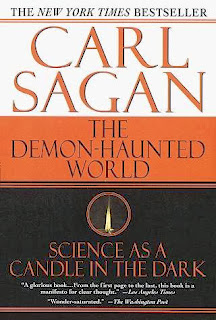I am admittedly, a Carl Sagan fan. As such, this book is not unfamiliar to me. As such, rereading it in trying times (what I will constantly refer to as the) self-immolation also known as government shutdown, his words are as poignant, as prescient as they were in the mid nineties when it was first published.
I completely avoided my "sermon soliloquy" Sunday, or tried to - see "self-immolation" above. Some paragraphs, sentences on my Kindle (unintentional Freudian slip) gave me pause. I share them without comment or edit, save underlined highlight:
For me, there are four main reasons for a concerted effort to convey science - in radio, TV, movies, newspapers, books, computer programs, theme parks, and classrooms - to every citizen. In all uses of science, it is insufficient - indeed it is dangerous - to produce only a small, highly competent, well-rewarded priesthood of professionals. Instead, some fundamental understanding of the findings and methods of science must be made available on the broadest scale.
- Despite plentiful opportunities for misuse, science can be the golden road out of poverty and backwardness for emerging nations. It makes national economies and the global civilization run. Many nations understand this. It is why so many graduate students in science and engineering at American universities - still the best in the world - are from other countries. The corollary, one that the United States sometimes fails to grasp, is that abandoning science is the road back into poverty and backwardness.
- Science alerts us to the perils introduced by our world-altering technologies, especially to the global environment on which our lives depend. Science provides an essential early warning system.
- Science teaches us about the deepest issues of origins, natures, and fates - of our species, of life, of our planet, of the Universe. For the first time in human history we are able to secure a real understanding of some of these matters. Every culture on Earth has addressed such issues and valued their importance. All of us feel goosebumps when we approach these grand questions. In the long run, the greatest gift of science may be in teaching us, in ways no other human endeavor has been able, something about our cosmic context, about where, when and who we are.
- The values of science and the values of democracy are concordant, in many cases indistinguishable. Science and democracy began - in their civilized incarnations - in the same time and place, Greece in the seventh and sixth centuries B.C. Science confers power on anyone who takes the trouble to learn it (although too many have been systematically prevented from doing so). Science thrives on, indeed requires, the free exchange of ideas; its values are antithetical to secrecy. Science holds to no special vantage points or privileged positions. Both science and democracy encourage unconventional opinions and vigorous debate. Both demand adequate reason, coherent argument, rigorous standards of evidence and honesty. Science is a way to call the bluff of those who only pretend to knowledge. It is a bulwark against mysticism, against superstition, against religion misapplied to where it has no business being. If we're true to its values, it can tell us when we're being lied to.
Related embed:

Comments